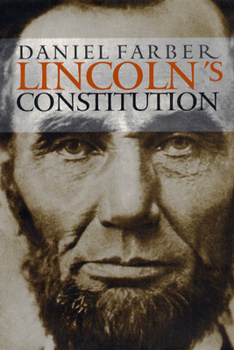Lincoln's Constitution
Select Format
Select Condition 
Book Overview
In Lincoln's Constitution Daniel Farber leads the reader to understand exactly how Abraham Lincoln faced the inevitable constitutional issues brought on by the Civil War. Examining what arguments... This description may be from another edition of this product.
Format:Hardcover
Language:English
ISBN:0226237931
ISBN13:9780226237930
Release Date:May 2003
Publisher:University of Chicago Press
Length:256 Pages
Weight:1.15 lbs.
Dimensions:1.0" x 6.3" x 9.3"
Customer Reviews
5 ratings
Fantastic!!
Published by Thriftbooks.com User , 14 years ago
Very pleased with the service I received! Book was in excellent condition, delivered in record time! Would be happy to purchase from this seller again!!
Complementary readings to Farber's interesting book
Published by Thriftbooks.com User , 15 years ago
There are already several good reviews on this book, so I will only suggest reading the following books on the USA in addition to Farber's: A) On Lincoln and/or the Civil War: 1) "Lincoln: a biography" by Benjamin P. Thomas (a classical biography, written more than half a century ago which has passed the test of time with brilliant qualifications); 2) "Battle Cry of Freedom: The Civil War Era" by James M. McPherson (nowadays the standard, very readable, one-volume history of US Civil War); and 3) "Perilous Times: Free Speech in Wartime: From the Sedition Act of 1798 to the War on Terrorism" by Geoffrey R. Stone, specially chapter II "The Civil War: Mr. Lincoln's First Amendment" (in fact, all the book is worth-reading); B) Dealing with constitutional and political ideas: 4) "Constitutional History of the American Revolution" by John Phillip Reid; 5) "America's Constitution: A Biography" by Akhil Reed Amar; and 6) "Liberty's Blueprint: How Madison and Hamilton Wrote The Federalist, Defined the Constitution, and Made Democracy Safe for the World" by Michael Meyerson. C) Other books chosen with a historically impressionistic approach: 7) "The Death Penalty" by Stuart Banner; 8) "The Churching Of America, 1776-2005: Winners And Losers In Our Religious Economy" by Roger Finke and Rodney Stark; and 9) "American Colonies. The settling of North America" by Alan Taylor.
If you think Dubya should be impeached...
Published by Thriftbooks.com User , 16 years ago
REad this book. It will make you realize that some President's have gone much farther in their goal to make America safe and protect the Constitution. Of course Lincoln's example may not always be the best guide to PResidential actions.
Popular legal history at its best
Published by Thriftbooks.com User , 20 years ago
"Lincoln's Constitution" first examines the Constitution as Lincoln found it at the beginning of his administration, with emphasis on state - federal relations, including the right of secession. Like most modern legal scholars, Prof. Faber clearly sides with Lincoln on this (and most other constitutional issues), but he is also careful to show that believers in states' rights and secession had good historical reasons for their views. With this background, the author then examines the Constitutional issues Lincoln faced in dealing with the unprecedented challenge of waging the Civil War. Here the focus shifts to presidential war powers and civil liberties in time of war. The author points out where Lincoln was right (in light of later precedents) and where he was wrong. Again, the views of both his supporters and his critics are fully examined. Finally, Faber clearly explains the relevance of all these issues for citizens of our own time.Authoritative, up-to-date and balanced, "Lincoln's Constitution" is an essential supplement to J.G. Randall's classic (but now dated) "Constitutional Problems Under Lincoln."
Great Book, but heavy history
Published by Thriftbooks.com User , 21 years ago
Being interested in the legality of Lincoln calling on troops to supress a domestic and not a foreign threat is appealing to me, since it was, what I thought, a violation of the powers of the presidency. Grabbing this, I thought it might bring aboveboard his actions. The title is somewhat deceieving in that the first 4 1/2 chapters discuss the founding fathers and their ideaology on various presidential powers and states' rights: intriguing to read, but way too much history of the constitutional debates. Finishing the book, I came to realize this was the author's way of defending his conclusions: that Lincoln did not abuse his powers and acted within the bounderies of constitutional law (though the last chapter discussing Lincoln's enfringement on Free Speech is hard to swallow as legal.) Still a fascinating read on the topic of constitutional power,that is just as important today as it was then.





